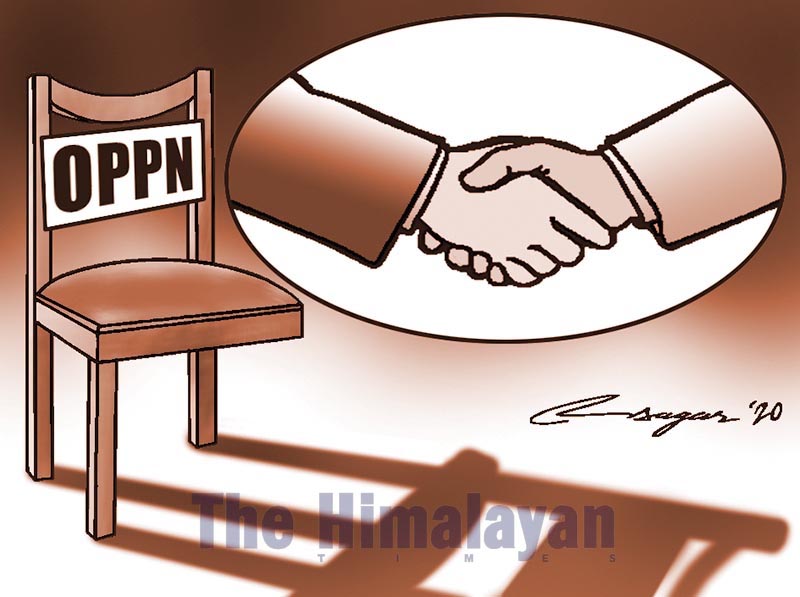Power sharing by the Opposition: Violation of parliamentary norms
Promiscuous power sharing is strategically advantageous for appeasing the political parties because it allows access to power even when they fare miserably in the state elections as is evident with the present leadership of the Nepali Congress
The hobnobbing by the Opposition with the government, leading to the appointment and retention of some Congress nominees as vice chancellors and ambassadors respectively, has sent a chill up the spine of bona fide Congress volunteers. This is because it is contrary to the spirit of parliamentary democracy, for which they had sacrificed the golden period of their life.
It is well known that the Opposition is considered as a government in waiting, and its duty is to keep the government on its toe. The Opposition cannot play this role effectively after maintaining such an illicit relationship with the government. Without the Opposition, parliamentary democracy gets reduced to nothing but a sham.
The government and Opposition have existed in this world side by side since time immemorial like body and shadow. No wonder then that the Opposition later on started being known as the shadow government. Its preliminary manifestation, however, can be found in the signing of the Magna Carta in Britain in 1215 when John was the king. Though John was a glutton and died after consuming cider and peach excessively, his contribution to the rise of democracy is notable indeed. King Abhaya Malla was ruling in Nepal then, who was the first unfortunate Nepali King to die in an earthquake, that of the year 1255 with its epicentre in Gorkha.
The real palpable and tangible government and Opposition came into being in Britain in the year 1783 when the British Whig party leader Charles James Fox, known for his fierce oration and licentiousness became the leader of the Opposition for 22 long years. Nepal was then ruled by a rather eccentric Rana Bahadur Shah, known more for his bad tantrums than good governance. Though there was no declared government and Opposition during this time, the Thapa and Pandey groups were at daggers drawn with each other and represented the de facto government and Opposition turn by turn.
The presence of the government and Opposition became more prominent in Nepal in 1959 when the Nepali Congress formed a two-thirds majority government under the charismatic leadership of B P Koirala after securing a landslide victory in the 1957 election. But this first ever elected nascent democratic government in Nepal was nipped in the bud by King Mahendra, following which it came to a pause till the restoration of multi-party system of governance in 1990. Since then, Nepal has had the luxury of having a government and Opposition in the country.
The Opposition in the post-1990s had more or less maintained its identity by staying away from power sharing. But the recent promiscuous dealing of the Nepali Congress with the government has put the last nail in the coffin of the present leadership, whose presence in the political arena had been overshadowed by, firstly, the dismal defeat in the last election and, secondly, by the inability to settle the never-ending conflict within the party.
Power sharing cannot be wished out of existence in politics. Especially after the conflict situation, power sharing with the rebels was an established practice.
In Nepal, after signing a peace pact with the Maoist rebels, they were given 73 seats in the restored Parliament. After that, however, several elections have been held, and the Maoists have already joined the mainstream of parliamentary democracy. Power sharing at this point of time by the Opposition is a gross violation of parliamentary norms and cannot be accepted under any circumstances. This is because the voters have nowhere to go after the government performs rather badly when the Opposition politically elopes with the government. Under the present circumstances, political events could take two courses. Firstly, the leader of the opposition faction
in the Nepali Congress could use it as an election agenda and win the presidential election in the forthcoming national convention of the Nepali Congress. The party could then pull this Congress fat out of the fire by restoring its damaged image.
Secondly, if the present leadership continues to be at the helm of political affairs in the Nepali Congress, Nepali democracy will go the Indonesian way. In Indonesia, the third largest democracy of the world, the opposition did not foster as expected due to the frequent power sharing by Indonesia’s presidents. What has emerged can be said to be some kind of non-desirable party cartelisation, leading to a stunted and scuttled Opposition.
Promiscuous power sharing is strategically advantageous for appeasing the political parties because it allows access to power even when they fare miserably in the state elections. This is evident now in Nepal as the present leadership of the Nepali Congress has accepted political support from the government even after facing the worst ever defeat in its history.
This is indeed a very alarming situation for politics in Nepal because such power sharing will lead to further weakening of the Opposition party as in the case of Indonesia. Though the politicians benefit from it, parliamentary democracy will suffer in the wake of a weakened Opposition. It can be said that the Nepali Congress and Nepali politics will further totter on a political precipice from where there is virtually no point of return if the present political power sharing makes further headway in the future.






